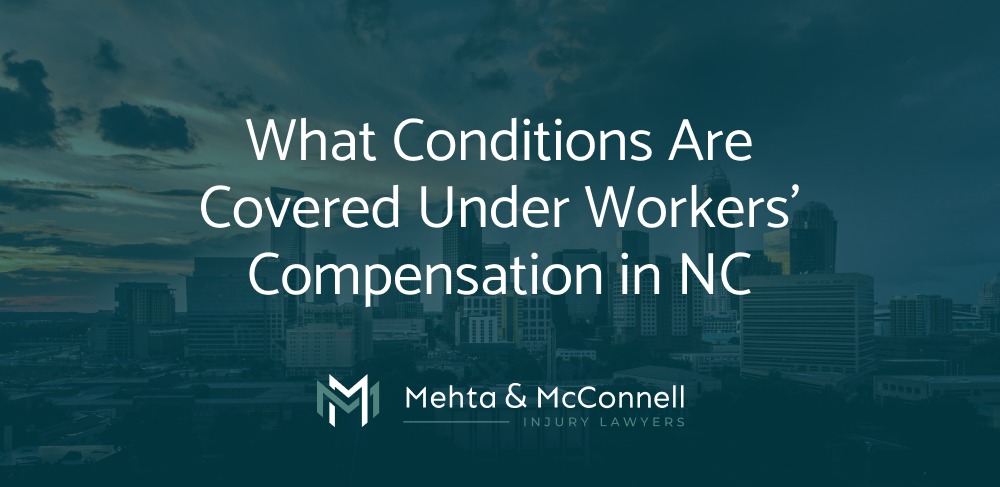
Over 67,000 North Carolina workers were hurt on the job in 2021. Thankfully, most employers in our state provide workers’ compensation insurance to cover these injuries.
That said, many don’t realize workers’ comp only covers certain incidents.
If you have questions about your workers’ compensation claim, speak with the lawyers at Mehta & McConnell.
We’ll review your case and help determine if your injury falls within the conditions covered by workers comp.
Workers’ Compensation in North Carolina
Workers’ compensation provides employees compensation after a workplace or work-related injury.
It is a no-fault system, meaning you can receive compensation regardless of who is to blame for the injury. This policy helps you get proper medical care and benefits for lost wages due to work-related incidents.
North Carolina law states employers with at least three employees must offer workers’ compensation. There are exceptions to this requirement for some industries, such as railroads, domestic servants, and government employees.
What Is Covered Under Workers Comp?
Only certain injuries, illnesses, and conditions are covered under workers comp. Any harm you experience must have a clear link with your job duties.
Accidents on the Job
Incidents that occur while at work are some of the most common conditions covered by workers comp.
Some examples of accidents on the job include:
- Slip and fall accidents,
- Falling objects, and
- Vehicular accidents.
Remember, your employer’s insurance must cover these damages no matter who caused the accident.
Repetitive Stress injuries
Many jobs these days require tasks like clicking a computer mouse or assembling goods. Employees must perform repetitive motions to do these tasks. This repetition can lead to a stress-related injury.
Some examples of repetitive stress injuries include:
- Tennis elbow,
- Carpal tunnel syndrome, and
- Lumbar strain.
These types of claims may be compensable if it can be proven that they were caused by the work assigned, and the employee was at a greater risk of developing these conditions than members of the general public.
Occupational Diseases
Certain professions expose employees to specific health hazards. Workers’ compensation in North Carolina extends its coverage to include many recognized occupational diseases. You may be eligible to receive compensation if your job caused your illness.
Some examples of occupational diseases include:
- Asbestosis,
- Hearing loss, and
- Work-related asthma.
Employers often deny liability for these conditions. If this happens, you may need an expert to show that your work environment contributed to these diseases.
Conditions Not Covered by Workers’ Compensation
Certain conditions fall outside the scope of workers’ compensation. Some of these exceptions include:
- Intentional self-inflicted injuries. Workers’ compensation does not cover injuries that result from intentional self-harm. Deliberate harm to oneself goes beyond the scope of workplace accidents.
- Injuries resulting from intoxication. Although workers’ comp is a no-fault system, this does not cover damages due to the use of drugs or alcohol. Employers have the right to deny claims if intoxication is a contributing factor.
- Violation of company policies. Employees might not receive workers’ comp if they violate policy. Violations of safety standards don’t always bar claims unless the employee intends to get injured.
If worker’s compensation denies your claim, an attorney can help identify your options for recourse.
Benefits You Can Receive Under Workers’ Compensation
You may qualify for benefits from your employer’s insurer if your claim is for conditions covered by workers comp. Some of these benefits can include:
- Medical benefits. Workers’ compensation covers the expenses associated with medical treatment for work-related injuries. This includes doctor visits, treatment, prescription medications, rehabilitation, and other necessary medical services.
- Wage replacement benefits. Some injuries lead to temporary disability and prevent an employee from working. Workers’ compensation provides a weekly wage to reduce financial strain during recovery.
- Rehabilitation services. Some workers cannot return to their previous jobs due to work-related injuries. Rehabilitation can include job retraining, education, and help in finding suitable employment.
- Permanent disability. You can receive benefits if your injury leads to permanent impairment. Your compensation will depend on the nature and severity of the disability.
- Death benefits. Workers’ compensation may provide death benefits to the surviving dependents after fatal incidents. It can cover funeral expenses and offer financial support for dependents.
Receiving these benefits takes time, especially if you have complex damages. An attorney can help you file your claim and calculate damages to maximize your potential compensation.
How a Workers’ Compensation Attorney Can Help
Working with a workers’ compensation attorney can make a significant difference in the outcome of your case. Their support and experience can make the process easier and increase your compensation.
Comprehensive Case Evaluation
An attorney will thoroughly assess your case during your first visit. They will identify key elements and potential challenges.
This evaluation helps plan your legal strategy to make the strongest workers’ compensation claim.
Claim Documentation
An attorney manages all documentation required for your claim. They can help gather medical records, witness statements, and other evidence.
They will use this evidence to prepare your claim and estimate your damages.
Negotiation with Insurance Companies
Dealing with insurance companies can be complex and intimidating. Your attorney will be your advocate and handle all discussions with the insurer. They will ensure the insurance company considers all relevant aspects of your claim.
Representation in Disputes
In some cases, the employee and insurance company might dispute the merit or value of the claim. If this happens, your attorney will represent you in negotiations and court proceedings.
Representation can include showing evidence, examining witnesses, and arguing your case in court.
Handling Appeals
Insurance companies sometimes deny valid claims. When this happens, your attorney can appeal your claim to the North Carolina Industrial Commission.
They will handle all paperwork, gather additional evidence, and represent you in hearings to contest the decision.
Alleviating Stress
Facing a work-related injury is stressful. Trying to manage a legal dispute during this time only adds more frustration. Hiring an attorney lets you focus on your recovery while your lawyer handles the paperwork.
Mehta & McConnell Can Help with Your Workers’ Compensation Claim
Don’t go against your employer’s insurance company alone. Our lawyers used to represent workers’ compensation insurers and know all the reasons they used to deny claims.
Now, Mehta & McConnell uses this experience to help you fight back. Whether you have questions about the conditions covered by workers comp or are ready to file a claim, we are here for you.
Call our firm today to schedule a consultation.


